
3 signs it’s time for your business to switch banks

Changes in credit reporting and what it means for homebuyers

What’s the difference between Fannie Mae and Freddie Mac?

Common small business banking questions, answered

How liquid asset secured financing helps with cash flow

Hybridization driving demand

An investor’s guide to marketplace lending

What is a CLO?

Beyond Mars, AeroVironment’s earthly expansion fueled by U.S. Bank

Refinancing your practice loans: What to know

ABL mythbusters: The truth about asset-based lending

Common pitfalls to avoid in the equipment financing process

Finance or operating lease? Deciphering the legalese of equipment finance

Buying or leasing? Questions to ask before signing a contract

What type of loan is right for your business?

Collateral options for ABL: What’s eligible, what’s not?

When small companies buy big: The potential of asset-based lending

Can ABL options fuel your business — and keep it running?

Maximizing your infrastructure finance project with a full suite trustee and agent

How to maximise your infrastructure finance project

Private equity and the full-service administrator

Insource or outsource? 10 considerations

The secret to successful service provider integration
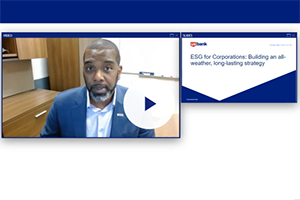
Webinar: ESG for Corporations: Building an all-weather, long-lasting strategy

Evaluating interest rate risk creating risk management strategy

Tech tools to keep your restaurant operations running smoothly

Unexpected cost savings may be hiding in your payment strategy

Safeguarding the payment experience through contactless

COVID-19 safety recommendations: Are you ready to reopen?

Tech lifecycle refresh: A tale of two philosophies

4 benefits of independent loan agents

At your service: outsourcing loan agency work

Middle-market direct lending: Obstacles and opportunities

ABCs of ARP: Answers to American Rescue Plan questions for counties

How to sell your business without emotions getting in the way

5 steps to take before transitioning your business

10 tips on how to run a successful family business

The moment I knew I’d made it: The Cheesecakery

Streamline operations with all-in-one small business financial support

How iPads can help increase efficiency in your salon

Tools that can streamline staffing and employee management

How to identify what technology is needed for your small business

Planning for restaurant startup costs and when to expect them

Opening a business on a budget during COVID-19

Talent acquisition 101: Building a small business dream team

Make your business legit

7 tips to help grow your business after launch

How to fund your business without using 401(k) savings

How I did it: Turned my side hustle into a full-time job

Costs to consider when starting a business

The different types of startup financing

How to test new business ideas

How to get started creating your business plan

What is needed to apply for an SBA loan

How to establish your business credit score

How to redefine challenges with business collaboration

The costs of hiring a new employee

How small businesses are growing sales with online ordering

How to expand your business: Does a new location make sense?

Using merchant technology manage limited staffing

What kind of credit card does my small business need?

Do I need a credit card for my small business?

How jumbo loans can help home buyers and your builder business

How a small business is moving forward during COVID-19

Prioritizing payroll during the COVID-19 pandemic

When to consider switching banks for your business

5 tips to help you land a small business loan

How to choose the right business savings account

5 questions business owners need to consider before taking out a loan

Leverage credit wisely to plug business cash flow gaps

How to establish your business credit score

8 Ways for small business owners to manage their cash flow

How to make the most of your business loan

How to accept credit cards online

Do you need a business equipment loan?

How to build a content team

Investing in capital expenditures: What to discuss with key partners

Multigenerational household financial planning strategies

LGBTQ+ financial planning tips

Do I need a financial advisor?

5 financial goals for the new year

How to track your spending patterns

How to manage your finances when you're self-employed

Year-end financial checklist

Good debt vs. bad debt: Know the difference

Reviewing your beneficiaries: A 5-step guide

Estate planning documents: Living trusts vs. will vs. living will

4 reasons estate planning is important

How to talk about money with your family

Financial steps to take after the death of a spouse

6 tips for trust fund distribution to beneficiaries

How to protect your digital assets in your estate plan

How to build wealth at any age

Retirement planning in the gig economy

5 unexpected retirement expenses

How to retire happy

Key milestone ages as you near and start retirement

Retirement income planning: 4 steps to take

4 tips to help you save for retirement in your 20s

Preparing for retirement: 8 steps to take

LGBTQ+ retirement planning: What you need to know

The connection between your health and financial well-being

8 steps to choosing a health insurance plan

What is Medicare? Understanding your coverage options

3 types of insurance you shouldn’t ignore

7 things to know about long-term care insurance

Is a Health Savings Account missing from your retirement plan?

How I did it: Switched career paths by taking an unexpected pivot

How I did it: Transitioned from the military to a private sector career

How I did it: Joined a board of directors

5 tips for being a great board member

Working after retirement: Factors to consider

4 steps to finding a charity to support

7 year-end tax planning tips

Should I itemize my taxes?

How to start investing to build wealth

Do your investments match your financial goals?

Investment strategies by age

A beginner's guide to investing

Can fantasy football make you a better investor?

Tips for navigating a medical hardship when you’re unable to work

11 essential things to do before baby comes

How to plan and save for adoption and in vitro fertility treatment costs

Checklist: 10 questions to ask your home inspector

Closing on a house checklist for buyers

Resources for managing financial matters after an unexpected death

What you need to know as the executor of an estate

What documents do you need after a loved one dies?

How to prepare for a natural disaster

Student checklist: Preparing for college

Webinar: Uncover the cost: College diploma

The A to Z’s of college loan terms

Co-signing 101: Applying for a loan with co-borrower

Practical money skills and financial tips for college students

How to build credit as a student

How I did it: Paid off student loans

Webinar: Bank Notes: College cost comparison

Annual insurance review checklist

From LLC to S-corp: Choosing a small business entity

How you can prevent identity theft

Is raising backyard chickens a good idea financially?

5 tips for creating (and sticking to) a holiday budget

Friction: How it can help achieve money goals

6 pandemic money habits to keep for the long term

How I did it: Learned to budget as a single mom

Your 4-step guide to financial planning

Webinar: Uncover the cost: Wedding

Webinar: Uncover the cost: International trip

What military service taught me about money management

Tips to overcome three common savings hurdles

Adulting 101: How to make a budget plan

How having savings gives you peace of mind

Personal loans first-timer's guide: 7 questions to ask

3 awkward situations Zelle can help avoid

What’s your financial IQ? Game-night edition

Webinar: Mindset Matters: How to practice mindful spending

How to save money while helping the environment

How to choose the right rewards credit card for you

How can I help my student manage money?

Common unexpected expenses and three ways to pay for them

Which is better: Combining bank accounts before marriage — or after?

Do you and your fiancé have compatible financial goals?

U.S. Bank asks: Transitioning out of college life? What’s next?

U.S. Bank asks: Do you know your finances?

Personal finance for teens can empower your child

Multiple accounts can make it easier to follow a monthly budget

Is it time to get a shared bank account with your partner?

It's possible: 7 tips for breaking the spending cycle

How to save for a wedding

Here’s how to create a budget for yourself

Don’t underestimate the importance of balancing your checking account

9 simple ways to save

7 steps: How couples and single parents can prepare for child care costs

Tips for working in the gig economy

Dear Money Mentor: How do I set and track financial goals?

5 reasons why couples may have separate bank accounts

Lost job finance tips: What to do when you lose your job

Money Moments: 3 smart financial strategies when caring for aging parents

Money management guide to financial independence

Money Moments: 8 dos and don’ts for saving money in your 30s

7 financial questions to consider when changing jobs

30-day adulting challenge: Financial wellness tasks to complete in a month

5 tips to use your credit card wisely and steer clear of debt

Travel for less: Smart (not cheap) ways to spend less on your next trip

Money Moments: How to manage your finances after a divorce

What’s in your emergency fund?

What you need to know about renting

How to stop living paycheck to paycheck post-pay increase

Understanding guardianship and power of attorney in banking

Financial gifts can be a valuable – and fun – choice for the holidays

What financial advice would you give your younger self?

How grandparents can contribute to college funds instead of buying gifts

How to open and invest in a 529 plan

Using 529 plans for K-12 tuition

Your financial aid guide: What are your options?

Is a home equity loan for college the right choice for your student

Parent checklist: Preparing for college

How to apply for federal student aid through the FAFSA

Be careful when taking out student loans

Everything you need to know about consolidating debts

5 tips to use your credit card wisely and steer clear of debt

5 steps to selecting your first credit card

How to use debt to build wealth

What’s a subordination agreement, and why does it matter?

Understanding the true cost of borrowing: What is amortization, and why does it matter?

7 steps to keep your personal and business finances separate

Know your debt-to-income ratio

How to use credit cards wisely for a vacation budget

Your quick guide to loans and obtaining credit

Dear Money Mentor: How do I begin paying off credit card debt?

Dear Money Mentor: What is cash-out refinancing and is it right for you?

Overcoming high interest rates: Getting your homeownership goals back on track

For today's homebuyers, time and money are everything

Crypto + Homebuying: Impacts on the real estate market

Should you buy a house that’s still under construction?

House Hacks: How buying an investment property worked as my first home

Your guide to breaking the rental cycle

What are conforming loan limits and why are they increasing

Military homeownership: Your guide to resources, financing and more

Webinar: Uncover the cost: Building a home

How I did it: Bought a home without a 20 percent down payment

Home buying myths: Realities of owning a home

4 ways to free up your budget (and your life) with a smaller home

Money Moments: Tips for selling your home

Money Moments: How to finance a home addition

How I did it: My house remodel

Beyond the mortgage: Other costs for homeowners

What is a home equity line of credit (HELOC) and what can it be used for?

10 ways to increase your home’s curb appeal

10 questions to ask when hiring a contractor

5 things to avoid that can devalue your home

Is it the right time to refinance your mortgage?

What to know when buying a home with your significant other

What is refinancing a mortgage?

These small home improvement projects offer big returns on investment

Should you get a home equity loan or a home equity line of credit?
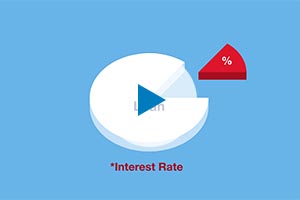
Webinar: Mortgage basics: What’s the difference between interest rate and annual percentage rate?
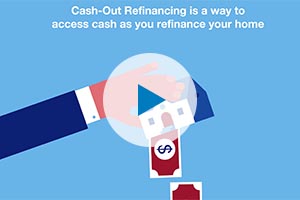
Webinar: Mortgage basics: What is refinancing, and is it right for you?

Webinar: Mortgage basics: Prequalification or pre-approval – What do I need?

Webinar: Mortgage basics: How much house can you afford?

Webinar: Mortgage basics: How does your credit score impact the homebuying experience?
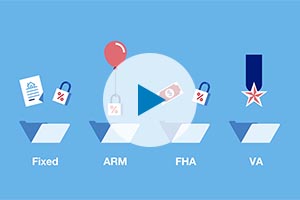
Webinar: Mortgage basics: Finding the right home loan for you

Webinar: Mortgage basics: Buying or renting – What’s right for you?
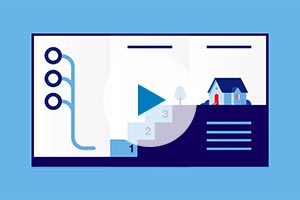
Webinar: Mortgage basics: 3 Key steps in the homebuying process

Is a home equity line of credit (HELOC) right for you?

How to use your home equity to finance home improvements

How do I prequalify for a mortgage?

Can you take advantage of the dead equity in your home?

8 steps to take before you buy a home

6 questions to ask before buying a new home

4 questions to ask before you buy an investment property

10 uses for a home equity loan
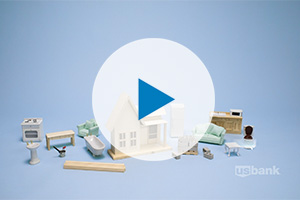
Webinar: Uncover the cost: Home renovation

Improving your credit score: Truth and myths revealed

How to spot a credit repair scam

6 essential credit report terms to know

5 unique ways to take your credit card benefits further

Myth vs. truth: What affects your credit score?

Test your loan savvy

Decoding credit: Understanding the 5 C’s

Credit: Do you understand it?

How to build and maintain a solid credit history and score

Should you give your child a college credit card?

U.S. Bank asks: What do you know about credit?

What types of credit scores qualify for a mortgage?

What is a good credit score?

Credit score help: Repairing a bad credit score
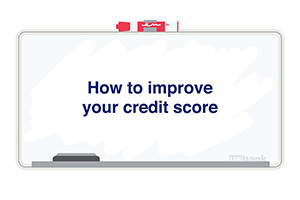
How to improve your credit score

I own two electric vehicles. Here’s what I’ve learned about buying and driving EVs.

How I did it: Deciding whether to buy an RV

Car shopping: Buying versus leasing your next vehicle

Take the stress out of buying your teen a car

How to winterize your vehicle

Questions to ask before buying a car

What you should know about buying a car

How to choose the best car loan for you

